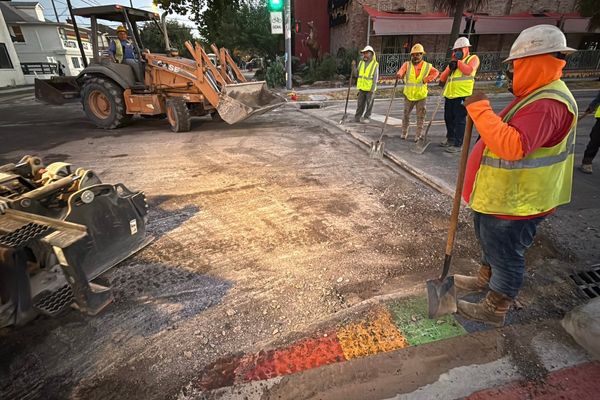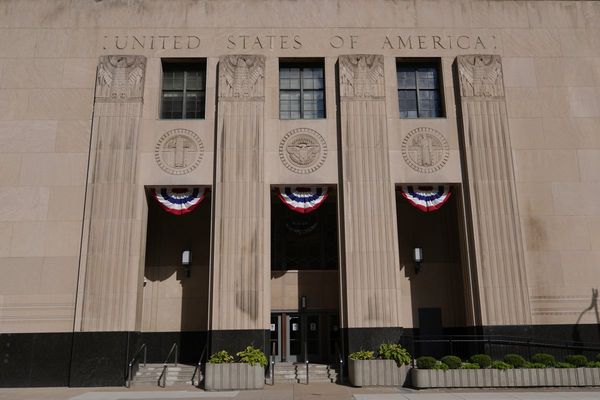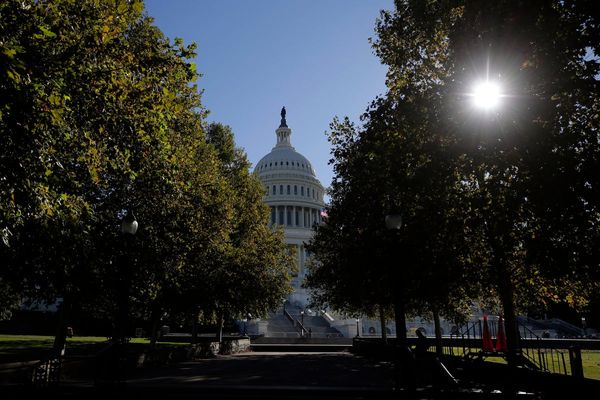Clare Elliott learned the importance of tracking her superannuation the hard way.
She was just 16 years old when she started working in retail and, now, a decade later, she believes her former employer was not paying her enough nor making the required compulsory super payments to her fund.
At the time, she says, she was earning $16 dollars an hour, which "seemed like a lot of money", so she accepted being paid cash without pay slips.
She worked casually for almost four years but says, without pay slips and timesheets as evidence, she can't get back the thousands of dollars she believes she could be owed.
"Every time it came to pay day, he (her former boss) would just hand me a bundle of cash, roughly what I was owed for the week's work," says Ms Elliott, now working as a union rep at the Victorian Trades Hall.
She is also a Labor party member and, since realising the problem of unpaid super, has been involved in political campaigns on the issue.
"Whenever I questioned this system, he said everything was fine on his end, he was doing payroll and paying my super," she says.
"It wasn't until I left [the job] that I realised that [the employer] actually wasn't doing everything correctly."
Employers who deliberately do not pay their workers their full wages and superannuation on time could soon face tougher penalties under a federal government crackdown.
Assistant Treasurer Stephen Jones says the failure of some employers to pay superannuation is a form of wage theft.
"We think unpaid super should be treated in the same way as wage theft," he says.
"If you are deliberately not paying your workers superannuation, you are stealing money from them."
According to Industry Super Australia (ISA), in 2019-20 about 2.5 million employees missed out on about $4.3 billion in super, with more than a quarter of employees losing an average of $1,736 per year.
ISA says that, in the financial years between 2013-14 and 2019-20, there was $33 billion underpaid at an average of $4.7 billion per year.
The Australian Tax Office (ATO) more conservatively estimates there is about $3.4 billion in unpaid super each year, based on its compliance activities.
"This is thousands and thousands of dollars that isn't going into (individual) workers' retirement savings and, when it comes to their time to retire, they could be tens, if not hundreds of thousands of dollars, out of pocket," Mr Jones says.
The government will be using the May federal budget to announce targets for the ATO to chase down the billions of dollars of unpaid super owed to workers.
"We think the tax office can lift its game in recovering unpaid super," Mr Jones says.
"We will be setting them some targets in the context of the budget to ensure that we get more of that unpaid super finding its way back into members accounts."
The government also wants to ensure "businesses know their obligations, that we've got better data on what is owed and what should be collected".
Paying super on the same day as wages
A recent Senate inquiry on underpayment has recommended that the government align the payment of super with wages.
This would change the current requirement for employers to pay super at least quarterly, to align it with the pay cycle, which is typically fortnightly.
Mr Jones says the government is "exploring a bunch of different options for how we can ensure that the money doesn't go unpaid in the first place" and the alignment of super with wages is "one of the ideas that we are looking at".
"Anything you do in that area is going to have implications for business, so we need to work through those implications as well," Mr Jones says.
Industry Super Australia modelling shows that shifting to payday super would also lead to a boost in workers' savings — as more frequent contributions attract compounding investment returns for longer.
The ISA modelling shows that a 30-year-old earning the age-based median wage could be $8,000 better off at retirement if paid super fortnightly instead of quarterly.
While many employers, especially larger ones, do pay super contributions fortnightly, along with wages, there are about 4.2 million workers who are paid super quarterly.
ISA chief executive Bernie Dean says most Australians just trust what's on their pay slip and assume their super has gone into their account.
"Sadly, about one-in-four Australians are finding out way too late that that money is not making it into their super account," he says.
"[The government] could actually solve much of the problem by just requiring employers to pay super at the same time as they pay wages.
"It shouldn't really be down to the employee to chase their unpaid superannuation through the tax office."
He says it is women and "the people that can least afford it" who were most impacted by unpaid super.
"It's young people in blue-collar jobs, labourers, machinists and then you've got people in service industries, hospitality," Mr Dean notes.
Super Consumers Australia director Xavier O'Halloran is also encouraging the government to align super payments with wages.
He says that, if the problem of unpaid super is allowed to continue, many more Australians will be "tens of thousands of dollars" worse off in retirement.
"People miss out on the earnings through those delays, but they can also miss out on vital insurance that they have in their superannuation, if they don't have an adequate balance in there to cover any of their insurance premiums," he says.
"It really puts people at financial risk."
The Australian Chamber of Commerce and Industry's (ACCI) director of workplace relations, Jessica Tinsley, says the lobby group — which represents both large and small businesses — supports the alignment of super and pay, in principle.
"This would just require a change that, when salaries or wages are paid, they would need to pay superannuation at the same time on the same day," she says.
"It seems like a streamlined approach that most businesses would be, in principle, supportive of, but we would just be keen to see the detail of what that would look like."
Calls for better policing from the ATO
According to data supplied by the tax office to the Senate inquiry, in 2019–20 the agency collected $28.1 million in Super Guarantee (SG) payments.
However, the report says that "the ATO's enforcement actions over the same period were less impressive".
During 2019–20, 12,110 payment plans were established, valued at $461 million, 21 per cent (or 2,500) plans were cancelled or defaulted after 120 days, and 73 per cent of employers who failed to pay full entitlements received no penalty, with most of the remainder required to pay less than a 51 per cent penalty.
At a public hearing on September 18, the committee was told that the ATO had considered using the direction-to-pay power on 40 occasions but, ultimately, failed to do so, stating "on each of these occasions the employer has entered into liquidation or insolvency and/or has entered into a payment arrangement".
The ATO also advised that it had issued 2,233 SG director penalty notices to directors of 1,572 companies for a value of $146 million, but that it had only collected $20.6 million of that amount, a 14 per cent recovery rate.
It also advised that it was implementing a number of recommendations from a recent Australian National Audit Office report, which included taking greater "preventative approaches, setting targets for Superannuation Guarantee performance measures, and making greater use of our debt-recovery powers".
"We take non-compliance with Super Guarantee obligations seriously and have a focused review-and-audit program into the non-payment," an ATO spokeswoman told the ABC.
"The ATO reviews every employee notification received and will pursue any outstanding amounts, including through issuing director penalty notices."
Tougher penalties for wage and super theft?
The government response to the Senate inquiry into underpayments accepted that its main recommendation that wage theft should be criminalised, and the new offence should apply to all forms of remuneration, including superannuation.
Among other recommendations from the inquiry was "improving proactive Superannuation Guarantee initiatives, including strengthening and increasing penalties for deliberate and repeated acts of non-compliance, the inclusion of random audits, and the publication of enforcement activities in relation to Superannuation Guarantee payments".
Asked whether employers should face tougher penalties, Mr Jones says: "Penalties are a part of it, but the preferable approach is ensuring that the money doesn't go unpaid in the first place."
"We need to treat businesses that are deliberately doing the wrong thing, differently to businesses that have made an inadvertent mistake," Mr Jones says.
Mr O'Halloran says that, sometimes, employers make genuine mistakes and "they need to be able to be given time to correct that".
"But for those that have shown a real intent, and a consistent pattern of behaviour of non-payment of superannuation, I think tougher penalties are required to send a really clear message that it's not on, it's theft," Mr O'Halloran says.
ACCI's Ms Tinsley suggests the Fair Work Ombudsman has substantial powers and could also play a role in chasing down employers who deliberately fail to pay worker entitlements.
She says the employer group, in principle, supports moves to criminalise wage theft and increase penalties for deliberate non-payment of wages and super.
However, Mr Tinsley adds, that it is important that "good employers" — who try to do the right thing but trip up because of complicated industrial relations laws — are not penalised.
"We're certainly open to the discussion around that increase of penalties for deliberate underpayments, but there's a real science behind this and we want to make sure that … the punishment fits the crime," she says.
"In terms of the general retail industry, which applies to big employers, big retailers and small, mum-and-dad retailers as well, under that award alone, for permanent employees you might see 500-odd different rates of pay, and then another 500 for casual employees.
"You put that together, that's 1,000 different rates of pay that small, mum-and-dad retailers have to get across. So, of course, when you've got a complicated system like that, you are going to see these underpayments popping up time and time again."
Missing out on super when you are young compounds by retirement
Ms Elliott also wants to see changes that will stop young people being ripped off on their super.
Last year Ms Elliott received an email in her myGov account from the ATO saying that she was owed super.
She says "it was only one year's worth of super and totalling about $800".
"I know for a fact that [in her previous] four years of part-time work [as a teenager], I would have earned a hell of a lot more than $800," she says.
"I'm going to be in a really precarious situation, because I missed the first several years where I should have been earning great super and great interest."
Aligning the payment of super with wages, she says, would allow young people to better track whether their super payments are being correctly made.
"With more frequent deposits of your superannuation, you can see exactly where your money is going," Ms Elliott says.
"You can grow your accounts and you can do more with your superannuation. In whatever way you want."
She also hopes there will be tougher policing and tougher penalties imposed on employers who do the wrong thing.
"It's not a very victim-centric approach. There needs to be alternative ways for people to try [to] get their superannuation back … and get their stolen wages back."







